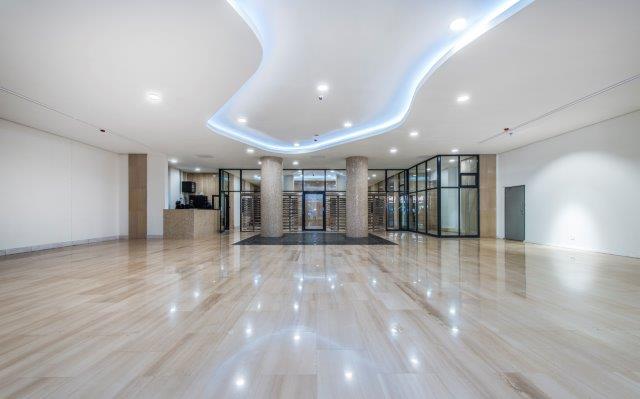Infrastructure PR
Technology Workspace Trends Continue To Impact Property Sector
In addition, vacancy rates remain stubbornly high, and there is a definite slump. There are, however, opportunities for those who can look at property with a fresh eye, according to Paragon Group Director Estelle Meiring, who is in charge of work acquisition and client liaison.
With a lot of speculation as to the end of Greenfield developments in these high-end precincts, Meiring is convinced that instead “they will adapt and change over time. I think there will be a lot of repurposing of buildings even here, as is happening in Johannesburg.”

Here, Paragon Architects South Africa (PASA) undertook a project for client HCI Properties, part of Hosken Consolidated Investments (HCI), to convert the former ANC Shell House headquarters at 51 Plein Street into a 563-unit residential development.
“We are not as well-known for this kind of refurbishment work as some of our more iconic buildings.However, we certainly have the skill set, and I can see us becoming more prominent in this sector as the market shifts,” Meiring highlights.
The shift in the property market is due to larger trends such as “the weak economic climate, political noise, and land ownership concerns.” Hence, developers have become more cautious as a result. However, Meiring stresses there is reason to hope that the economic climate will start improving, especially towards year-end.
The massive vacancy rates reflected in the office-space sector are also prevalent in the retail and industrial sectors, which means that any kind of overall take-up will take time to have an effect. Due to their large operating costs, the retail sector will probably be hardest hit by the substantial upcoming electricity increases, predicted because of Eskom’s ongoing financial woes.
Looking at the retail, industrial, and office space sectors, Meiring reiterates that the latter is the biggest under-performer at the moment. Industrial and warehouse space, on the other hand, is performing marginally better at the moment, not due to any uptake in manufacturing growth, but because the drive towards online shopping has seen an increased demand for logistics and distribution infrastructure.
“It has been relatively easy to make a profit in the property sector over the last ten to 15 years. We have experienced fantastic growth, but are not going to see that in the next few years. The factors that fuelled the boom have dissipated, and the dynamic has shifted,” Meiring elaborates.
While the demand for mid-level housing has slowed down as well due to consumer affordability issues, Meiring adds that the affordable housing segment is a prize growth area. “That is why conversions make a lot of sense. If you start off with the right building and refurbish it properly, you can actually produce a quality product that is quite affordable. Shell House is a prime example.”
As well as overseeing new projects such as the Paragon Group’s latest private-university project, Meiring has also been shepherding the group’s latest venture in Cape Town, where it has opened a regional office at the Pavilion on the Waterfront. “We were getting more and more enquiries from potential clients, and could discern a gap in the Cape Town market for our unique service offering,” she reveals. After some initial discussions, it was decided to open up a small office.
“The reaction has exceeded our expectations. While the market is affected by similar national concerns, I think Cape Town is going to outperform most of the other big cities in the next few years.” Meiring points to the half-yearly vacancy data rates from the Investment Property Databank (IPD), which reveals that there has not been as much over-building in Cape Town. “I am not talking about a massive boom, but there are interesting opportunities there.”
Meiring adds that the private-university project being undertaken by the Paragon Group indicates that this sector is still showing some green shoots, despite it being not as recession-proof as believed by some pundits. “We have been involved in this sector for many years, and there certainly is still a demand.”
Apart from forays into the Western Cape and KwaZulu-Natal, the Paragon Group continues to expand into selective markets in Africa. “We tend to be careful how we choose the projects and clients here, to ensure it makes business sense.” A resounding success has been the Mbabane Hilton Garden Inn in Swaziland, which won the 2019 SAPOA Property Development Award for Innovative Excellence for an International Development.
Meiring points to Kenya and Ghana as potential markets. “However, we are not only just looking here. As globalisation increases, and technology allows us to connect more easily with people in other countries, I think it will be interesting to look at places like Europe and Australia, and other parts of the world as well.”
Rapidly-changing technology has also assisted the Paragon Group’s clients to better visualise their projects before construction even commences. “It is hugely helpful with the design process. While we start off with concept sketches, the 3D environment allows us to interrogate our designs and determine if they respond accordingly to the client’s specific requirements.”
The boom in Virtual Reality and Augmented Reality is likely to result in new market opportunities. “I think it is going to be interesting for us architects to create these digital meeting and collaborative spaces,” Meiring speculates.
Another key factor impacting on the demand for office space is the trend towards flexible working hours and disruptive innovations such as shared workspaces. Technology has empowered people to work from home, or to work from a coffee shop or a shared workspace.
“However, the more we interact online, the greater our need for human interaction. In terms of the office of the future, this is unlikely to change. People need to meet, interact, brainstorm, and collaborate. And that is what these spaces are about.”
The traditional square metre rate per person, in terms of allocating a single desk and chair, will no longer be the yardstick for design. “The trend going forward will be about communal spaces. Property developers are going to have to take this into serious consideration. That is why we are seeing an increasing trend for mixed-use precincts.” An excellent example, and another award-winning project for the Paragon Group, has been the Alice Lane precinct in Sandton.
Mixed-use precincts do not only apply to the higher end of the market, with communal spaces equally important in the residential market. “I think an interesting trend to watch out for, which we have not seen a lot of in South Africa yet, is the communal living market, where people have a very small living space, but then the building itself has a lot of communal spaces and facilities. This also plays into the affordability trend, as it gives people access to a whole range of additional amenities.”
A similar trend is emerging in the education market, with multiple tertiary institutions combined on a single campus, such as in Dubai, which allows different ‘brands’ to share canteen space and related facilities.
Related to this trend is the large number of leading international brands entering the South African market for the first time, such as shared workspace giant WeWork, which has taken up five floors in the Paragon-designed The Link building in Rosebank.
Paragon Interface was the Architect of Record for this fast-track fit-out project. “WeWork is coming in with quite a force. I think it is all part of this shift in how offices operate, and how people see offices, and they are picking up on that demand quite quickly,” Meiring notes.
What continues to give Paragon Group the leading edge is its dual expertise and experience in architecture and interior architecture. It is for this reason that Meiring continues to remain optimistic about the future. “Yes, I am confident. But I think we are all going to have to rethink how we operate – not only us as architects, but also property developers and our other traditional clients.
“I think the opportunities will simply come from different places than they have traditionally. It is all about opening up that scope, and looking around to see where we can identify growth. I think we, as both an industry and a county, are very adaptable and adjustable,” Meiring concludes.
For more information, visit: www.paragon.co.za.






 Sign-up and receive the Business Media MAGS newsletter OR SA Mining newsletter straight to your inbox.
Sign-up and receive the Business Media MAGS newsletter OR SA Mining newsletter straight to your inbox.